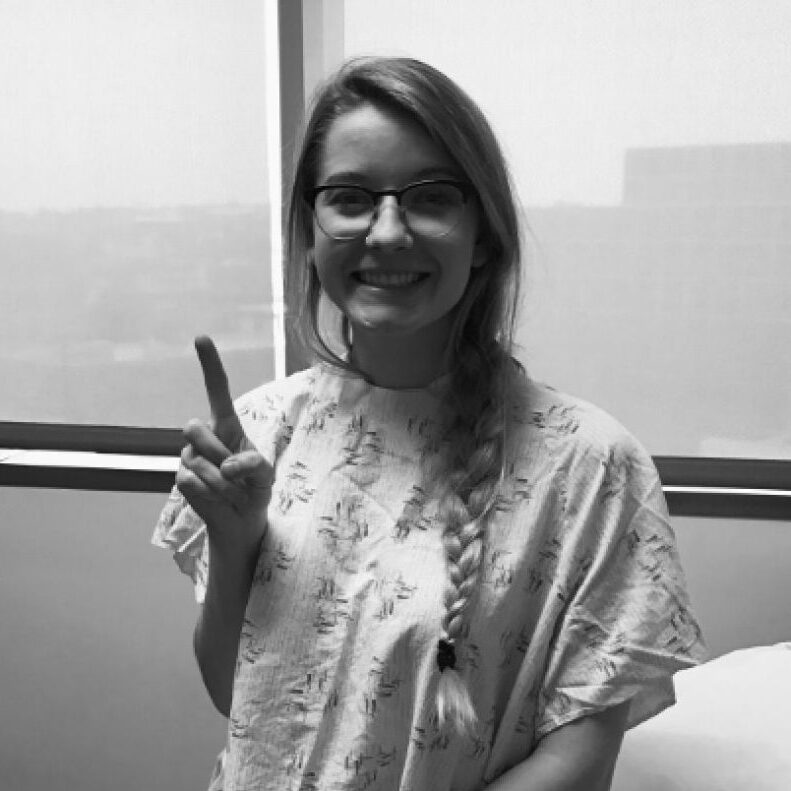"CRMO was once considered strictly a childhood disease, but many adults have been diagnosed with it.” Wikipedia 2017
As research continues, we realize much of the information online, regarding adults with CRMO, is outdated and incorrect.
In our desire to deliver the most accurate information possible, we have contacted adult rheumatologists and researchers who, in the coming months, will add much needed information to this page. Please be patient with us as we gather this information.

Transitioning from Pediatric to Adult Care with CRMO. Written by Lauren Potts
Transitioning from pediatric to adult care can be a scary experience. After years of leaning on my mom for support, knowledge, and advocacy, I finally turned 18 and was in charge of my own healthcare. It felt a little like I was being pushed into the deep end of a pool. With sharks.
A little background: I have CRMO (Chronic recurrent multifocal osteomyelitis, otherwise known as CNO/Chronic non-bacterial osteomyelitis). I was diagnosed at age 12 after a year of extreme pain and confusion over a possible cancer diagnosis. My dad worked every day, so my mom handled all my health-related issues. We spent a lot of my middle school years at doctors’ offices, hospitals, labs, and radiology clinics as we tried to make sense of my disease. It’s rare and affects as few as 1:1,000,000, though the number may be higher due to misdiagnosis or lack of research. My experience as a kid was confusing but my mother was really good at explaining what was going on with my body in a way that a 12 year old could understand. This helped me later on when I had to transition to adult care.
My disease (CRMO) requires me to see a rheumatologist, who specializes in bone and joint pain. As a child, I was seen by a team of pediatric rheumatologists at the Lucile Packard Children’s Clinic at Stanford. When I look back on my experience, I remember my mom shuttling me to appointments, scans, blood tests, and other health-related outings, and overall, I felt really fortunate to be able to let her handle major decisions and most of the planning. My mom was my biggest advocate, and she made sure I received the best care possible during a painful period in both of our lives. From her, I learned a few things.
Here’s a side note before you continue:
It is illegal for me to give specific medical advice as I am not a doctor. This write-up is meant to suggest options for those who are figuring out the intricacies of transitioning from pediatric to adult care, but by no means am I advising anyone on their own health. Every individual is different, and needs to do whatever is best for their condition. Please keep this in mind as you read ahead!
Here are some informal tips for children (and parents) beginning their transition to adult care:
- Keep track of your records and obtain physical copies of any scans. This is hugely important because if you end up going to college or moving out of your parent’s house, you’ll need to have all your information accessible for your new doctors. Having physical copies of scan reports is a huge help for any future healthcare professionals. For parents: Make sure your child knows how to access any records you’ve saved. Some hospitals have healthcare portals online, so if that’s where you save information, be sure to give your child the login information and show them how to navigate the website.
- When choosing an adult doctor, consult your pediatric rheumatologist. They may know a doctor in your area who can help with your illness. If possible, they may be able to work with your new doctor and make your transition much smoother by providing them with any information they need. It’ll save you the hassle of transferring over confidential health records, which usually takes a while. If you’re moving away from home, research doctors in your new area and see who might be a good fit for you. Some rheumatologists might not know about CRMO, but may be willing to call a specialist who does know to consult on how to continue your treatment. Dr. Polly Ferguson in Iowa (who is a leading CRMO researcher and a pediatric rheumatologist) has spoken with my local rheumatologist, and helped him with the dosage for my current medication. Dr. Zhao at the Seattle Children’s Hospital is also a CRMO specialist. I currently fly out every few months to Seattle from California to see Dr. Philip Mease, an adult rheumatologist who works with Dr. Zhao. Dr. Mease works with my local rheumatologist to make sure I’m getting the best treatment possible. For information on CRMO specialists, see the bottom of this post.
- Educate yourself. When it comes to CRMO, the biggest weapon we have is education. Knowing about the disease and how to deal with the ups and downs can help immensely. Ask your doctors questions. Read research papers. Try to find resources that may help you (such as the new CRMO website, public medical journals, doctors, even your parents). There’s a support group on Facebook that’s full of incredible people who also have CRMO, or parents who have children with the disease. They are always happy to share their experiences and share their support. Learning more about this rare disease empowers us to make informed decisions about our healthcare.
- On that note, it was important for me to try to research my medications before agreeing to a treatment plan. In urgent situations, we often just want our pain to go away. However, hasty decisions may also lead to future health issues. Many medications have potentially serious side effects, so it’s important to spend some time asking others about their experiences, research online, and weigh your options to determine what the best path is for you.
- Learn how to deal with insurance. Dealing with insurance can be a huge pain, but insurance is so important for people with rare illnesses. It’s expensive to have CRMO. Specialty medication, scans, and appointments can be extremely pricey. Insurance may deny a medication or scan due to lack of research on CRMO. In this case, it’s important to know what to do if you are dealing with a denial. Some medications or scans require prior authorization, which means that your doctor may have to consult your insurance company directly in order to get your medication approved for coverage. Other medications may be denied because your disease isn’t on a list of illnesses benefitted by the treatment. When this happens, I sometimes send my insurance research papers (if possible) showing positive results with whatever medication I’m trying to get approved. I also might reach out to the company that manufactures the medication, as they often have discounted programs for people who can’t get insurance approval. I ended up paying $5 copays for major medications because I talked to the companies directly. Talking with my mom helped prepare me for all of these issues, and she explained how she was able to get medications approved and how to order refills through my insurance. Now I’m able to handle my insurance on my own without too many difficulties.
- If you’re heading off to college, consider registering with the office of disabilities. Many universities have a disability program for students, which may provide them with notes for absences, alternative testing resources, and any counseling they need to better their experience. I had to miss a lot of class in college due to pain and other issues with CRMO, so having the disability offices email my professors at the beginning of the semester with a list of my accommodations was majorly helpful. I also explained my disease to some of my professors over email, and was able to delay some deadlines when my flare-ups were bad.
When in doubt, call your mom/dad/support system. If you’re lost, confused, or just in pain, it’s important to have someone to lean on or vent to. Facebook groups of people united by illness are an awesome platform for sharing stories and information, and there is someone out there who is always willing to listen.
While learning the ins and outs of adult care can be daunting, it’s not impossible. With a rare disease, it’s much harder to find doctors who are able to treat my illness. However, when I did find an adult rheumatologist (Dr. Mease) who was willing to work with other doctors to better my care, I knew I was in good hands, no matter how far I had to travel to reach his offices.
I hope you can find care that works for your individual needs. Don’t give up until you’ve found it.
Much love and good health,
Lauren

